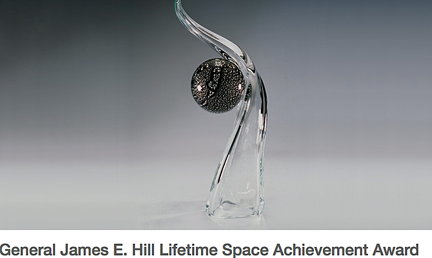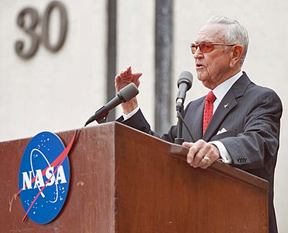
Each spring, during the Space Symposium in Colorado Springs, the Space Foundation confers its highest honor — the General James E. Hill Lifetime Space Achievement Award.

For 2018, the Space Foundation Board of Directors will honor Christopher Columbus "Chris" Kraft, Jr., the first U.S. human space mission flight director, credited with establishing NASA's Mission Control operations. Kraft was nominated for the award by Apollo 13 Commander Captain James A. Lovell, Jr., USN (Ret.), who wrote in his nomination letter about Kraft:
He established NASA’s Mission Control Center and was the chief flight director for the Mercury, Gemini and Apollo missions. Essentially, he was the creator of the way NASA conducts space missions. He is the perfect individual to receive the General James E. Hill Lifetime Space Achievement Award.
In announcing the selection of Kraft, Space Foundation Board Chairman Gen. William L. Shelton, USAF (Ret.), said of Kraft, "Chris Kraft is an absolute legend in manned spaceflight. As we look back on the incredible accomplishments of the Mercury, Gemini and Apollo programs, the Space Foundation is delighted to honor a key father of those successes."

Kraft speaks at a ceremony for the renaming of the Mission Control Center in his honor, April 14, 2011.
Chris Kraft compared his role as flight director to conducting an orchestra, not necessarily knowing how to play each instrument, but knowing how to bring them together to create music. He had a childhood interest in music and played bugle in an American Legion drum-and-bugle corps, later becoming the Virginia state champion bugler. He also had an early interest in baseball and played in college at Virginia Polytechnic Institute and State University (now Virginia Tech). Initially, he studied mechanical engineering, but on the encouragement of a professor, he graduated in 1944 with one of the first aeronautical engineering degrees conferred by the Institute.
In 1945, he was hired by the Langley Aeronautical Laboratory of the National Advisory Committee for Aeronautics (NACA), the predecessor to the National Aeronautics and Space Administration (NASA). In 1958, Kraft was selected as one of the original members of the Project Mercury Space Task Group. From 1961 to 1966, Kraft was flight director for the Mercury missions and many of the Gemini missions. He was the director of flight operations for the Apollo program until 1970, when he became the Manned Spacecraft Center deputy director.
Kraft established manned spaceflight rules that controlled every aspect of the mission, dictating that the astronauts obey the direction of mission control, and allowing the flight director “…to take any necessary action required for the successful completion of the mission.”
He served as director of the Johnson Space Center from 1972 until his retirement in 1982. He remained active as an aerospace consultant, and his autobiography — Flight: My Life in Mission Control – was published in 2001.
Honoring its late, long-time chairman, Gen. James E. Hill, USAF (Ret.), the award recognizes outstanding individuals who have distinguished themselves through lifetime contributions to humankind through exploration, development and use of space.
The award luncheon is sponsored by Boeing, and will be held on Wednesday, April 18, at The Broadmoor in Colorado Springs, site of the Space Symposium. Information about luncheon tickets is available at www.spacesymposium.org/register.

